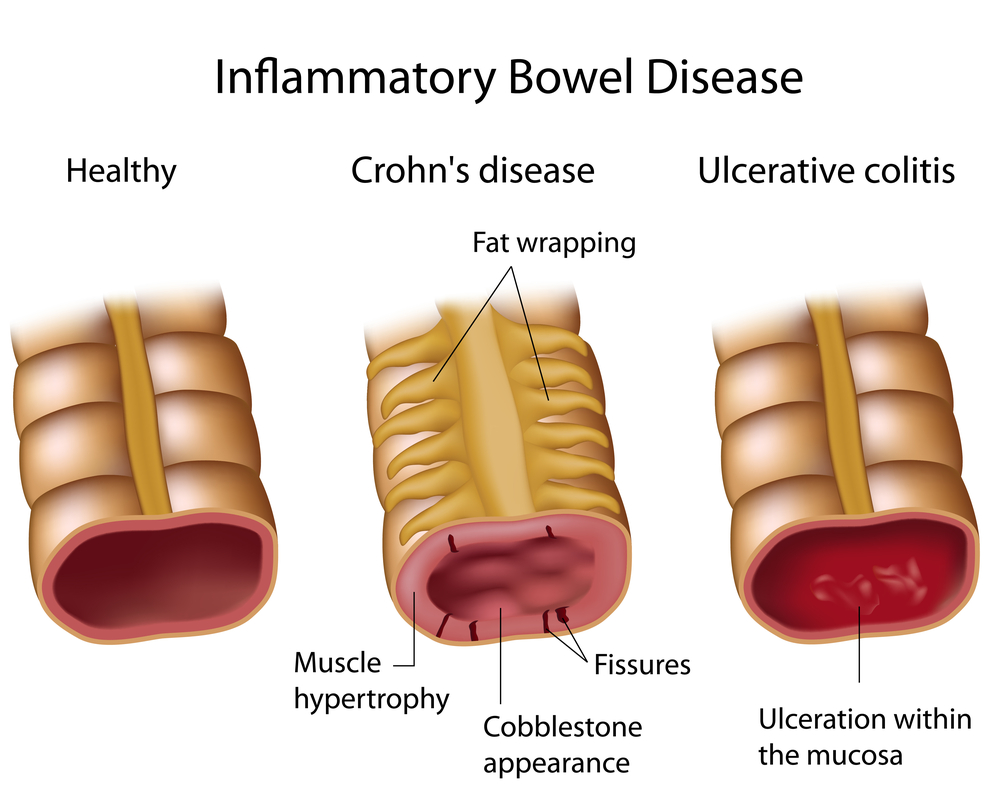CROHN’S DISEASE:
Crohn’s disease cannot be cured, but appropriate treatment can help suppress the inflammatory response and manage symptoms. The risk of side effects for each medication is generally proportional to the degree of the disease’s severity. Drugs with relatively few side effects are used in the earliest stages of treatment, with the aim of not worsening a patient’s condition with medication-related side effects at the risk of a slightly less effective Crohn’s treatment. Stronger drugs with more risky side effects are used to treat later stages of the disease.
Nutritional Therapy.
Intestinal inflammation can interfere with the absorption of nutrients, causing various deficiencies. Because of this, nutritional therapy is often part of Crohn’s treatment, especially in pediatric cases where regular development depends on proper nutrition. The Crohn’s and Colitis Foundation of America (CCF) reports that supplements such as vitamins and minerals should only be used in addition to conventional medical treatment. Registered dietitians can assist you in building a proper supplement and diet regimen that ensures proper nutrition without worsening digestive symptoms. Vitamin and mineral deficiencies are among the most common nutritional deficits that Crohn’s patients suffer. The following supplements may be considered:
- Vitamin B-12. If diet and oral vitamin supplements don’t correct this deficiency, a monthly intramuscular injection of vitamin B-12 or once weekly nasal spray may be required. Vitamin B-12 is essential to brain and nervous function, and can naturally be found in eggs, fish such as salmon, beef, shellfish, liver, and fortified soy and dairy products.
- Vitamin D. Vitamin D deficiency is common in people with Crohn’s disease. Vitamin D is essential for good bone formation and for the metabolism of calcium.
- Certain medications may also have an adverse effect on bone health, especially long-term use of steroids. Calcium can help to fortify bones and promote healthy muscle and nerve function.
- Iron. An iron deficiency can result from blood loss following inflammation and ulceration of the intestines seen in Crohn’s disease. Iron is essential to protein production in the body and can naturally be found in beef, fish, poultry, pumpkin seeds, spinach, cooked beans, tofu, and wheat germ among many other foods.
- Probiotic supplement. The inflammation of Crohn’s disease can decrease the population of what are considered to be healthy gut bacteria. Probiotics may help replenish healthy bacteria. Types of lactobacillus and bifid bacteria are typically found in most probiotic supplements.
In addition to recommending the proper supplements, your dietitian will be able to help you build a diet plan that avoids foods that exacerbate your Crohn’s symptoms. Typical inflammatory foods that you may want to avoid include:
- Alcoholic beverages including mixed drinks, wine and beer
- Foods high in fat such as butter, oil, mayonnaise, and fried foods
- Caffeinated beverages (i.e. coffee and tea, energy drinks)
- Chocolate
- Spicy foods
- Raw fruits and vegetables
- Foods high in fiber such as whole grains and beans
- Nuts, nut butters, and seeds
Nutritional therapy can be a critical part of treatment no matter what stage of your condition is in. Make sure that your doctor and dietitian are in communication about what supplements you are taking in order to avoid medication interference.
Medications.
Medications for mild to moderate Crohn’s:
- There is some evidence suggesting that antibiotics like ciproflaxin and flagyll may be helpful in treating mild to moderate cases of Crohn’s disease; however this is not backed up by significant statistical data. Antibiotics are, however, known to be effective in treating Crohn’s related complications such as infections occurring as a result of extra-intestinal manifestations.
- 5-Aminosalicylates (5-ASAs). 5-ASAs are a class of anti-inflammatory drugs that are thought to work as a topical anti-inflammatory for the GI tract. They have few side effects but can have a burdensome pill count (anywhere from 4-12 each day). Patients taking 5-ASAs should have regular blood and liver tests to check for potential low cell count and liver complications. Side effects may include abdominal pain, headache, dizziness, and nausea.Common 5-ASAs include:
- Sulfasalazine (Azufadine), which is one of the longest running drugs on the market for treating irritable bowel disorders. Though it has been used for decades, about 1 in 3 people are unable to sustain sulfasalazine use long-term due to severe side effects. The majority of people who react to sulfasalazine can, however, tolerate the other 5-ASAs that are listed below:
- Asacol
- Asacol HD
- Apriso
- Lialda
Medications for moderate to severe Crohn’s:
- Corticosteroids. Corticosteroids are anti-inflammatory and immunosuppressant, meaning that they reduce inflammation and work to suppress the immune system. Corticosteroids may be administered in pill form, by intravenous drip (IV), as an enema, or as a rectal suppository. Caution should be used in their prescription because of the risk of the body becoming steroid-dependent. When antibiotics and 5-ASAs fail to treat Crohn’s symptoms successfully, corticosteroids are the next-in-line drug. These include:
- Prednisone is one of the most commonly prescribed steroids, and is known to cause remissions in 70-80% of patients. It is not effective for long-term treatment and has high-risk side effects including osteoporosis, diabetes, depression, high blood pressure, and adrenal conditions.
- Budesonide is another corticosteroid that was created with the goal of having fewer side effects than prednisone and other corticosteroids. Instead of travelling throughout the whole body, budesonide is released only in the end of the small intestine and ascending colon, limiting its affects to those areas. This prevents more widespread side effects, but limits its use to only patients who have Crohn’s inflammation in those areas. Budesonide may cause headache, dizziness, and nausea.
- Immunosuppressants, also called immunomodulators or immune modifiers. This class of drugs works to block actions in the immune system that are involved with the inflammatory response. Common immunosuppressants include:
- Azathioprine (AZA). It may take 6 to 12 weeks for the full effects of AZA to be observed. AZA is taken orally, is successful in preventing Crohn’s flare-ups in 2 out of 3 patients, and has limited side effects (the most common being nausea). Few patients (2%) are allergic to AZA or develop pancreatitis (inflammation of the pancreas) as a result of treatment. It can also put patients at a higher risk of infection and lymphoma. Patients should receive regular blood testing while on this medication to detect any potentially serious side effects.
- Methotrexate (MTX). Unlike the orally-taken AZA, MTX is administered via weekly injection. MTX may take around 6 weeks for its effects to be noticed, and like AZA is successful in preventing Crohn’s flare-ups in 2 out of 3 patients. Patients taking MTX should undergo regular blood testing to monitor potentially low cell counts and liver damage. Folic acid supplementation should be paired with MTX treatment due to the drug’s depletion of the essential fatty acid. MTX should NOT be taken by pregnant women or those looking to conceive.
Medications for severe or fulminate Crohn’s:
- Anti-tumor necrosis factor-alpha (Anti-TNF-α). This type of drug works by using antibodies targeted at TNF-α, an inflammatory protein that has been found in high levels in Crohn’s disease patients. 2 out of 3 patients report symptom improvement within the first two doses, around 2-3 weeks. 30-50% of patients continue their success past the one year mark, and 30-50% will need to change their medication or anti-TNF-α dosage at some point during their therapy. Anti-TNF factors put patients at a slightly higher risk of serious heart disease, autoimmune conditions, and liver disease.The FDA approved Anti-TNF-α therapies are:
- Infliximab is used in cases where Crohn’s disease symptoms do not respond to any other therapies and in cases of severe Crohn’s extra-intestinal manifestations (i.e. fistulae). It has proven to be very effective, though it can lose its effectiveness over time in some patients. Infliximab is given via an intravenous drip (IV) during a two to three hour session. Follow up doses are given two and six weeks later. Following the initial 3 doses, the medication is administered every 8 weeks.
- Adalamumab (Humira). Adalamumab is used in cases where Crohn’s disease symptoms do not respond to other therapies, in cases of severe Crohn’s complications, or in cases where patients have lost responsiveness to Infliximab. Adalamumab is given in a single injection every other week following an initial four injections during the first week of treatment and two injections during week three. Patients may become unresponsive to adalamumab in time, a problem that can be addressed by upping the dosage to weekly injections or by switching medications.
- Certolizumab pegol (Cimzia). Certolizumab pegol is a prolonged effect anti TNF agent, and only needs to be administered once monthly either by an in-home nurse or at a medical facility.
- Anti-adhesion molecules. Anti-adhesion molecules work by preventing the flow of immune cells within the body, lessening the effect of the immune response observed in Crohn’s disease. The most commonly prescribed anti-adhesion molecules is:
- Natalizumab (Tysabri). Natalizumab was developed as a treatment for multiple sclerosis but was approved as a treatment for Crohn’s disease in 2008 due to evidence showing that it was effective at inducing and retaining periods of Crohn’s disease remission. There is a higher risk of developing progressive multifocal leukoencephalopathy (PML), a potentially deadly brain infection. Medical experts are more able to control the risk of developing PML today than when the drug first came out on the market. The risk of developing PML remains at 1 in 1000.
Surgery.
70-80% of Crohn’s disease patients will eventually need some type of surgery. Surgical options are considered when symptoms have not responded to medications or when there is a physical obstruction to the digestive tract. Surgeries may be be helpful in relieving symptoms connected with intestinal blockages, bowel perforations, fistulas, and rectal bleeding.
70-80% of Crohn’s disease patients will eventually need some type of surgery. Surgical options are considered when symptoms have not responded to medications or when there is a physical obstruction to the digestive tract. Surgeries may be helpful in relieving symptoms connected with intestinal blockages, bowel perforation, fistulas, and rectal bleeding.
Common surgical procedures used to treat Crohn’s disease patients include:
- Bowel Resection. This is the most common form of surgery for patients with Crohn’s disease. During the procedure, doctors remove the inflamed area of the intestine and reconnect the healthy portions. This is usually successful in reducing symptoms almost immediately, however 50% of patients see symptoms return within 5 years, and 20% will require additional surgeries within 10 years.
- Proctocolectomy and Ostomy. In cases where Crohn’s disease affects the entire colon, a proctocolectomy, or total removal of the colon, may be necessary. After the colon is removed, surgeons redirect waste through the small intestine to a hole in the abdominal wall known as a stoma. Waste then collects in a bag outside of the body that needs to be emptied several times a day. This is shown to effectively eliminate all Crohn’s disease symptoms in cases where inflammation was limited to the colon.
- Stricturoplasties are performed when there is an obstruction of the intestine that does not necessitate removal, and widen the intestine in order for waste to be able to pass through intestinal blockages.
ULCERATIVE COLITIS:
Even though there’s no known cure for UC, a combination of treatments including medications may be able to help you stay in control of the disease. These are the major classes of medication used to treat ulcerative colitis:
- Aminosalicylates (5-ASA) work on the level of the lining of the GI tract to decrease inflammation. A medication known as sulfasalazine (Azulfidine), combines sulfapyridine and 5-ASA, the NDDIC says. The sulfapyridine component carries the anti-inflammatory 5-ASA to the intestine. However, experts caution that sulfapyridine may lead to side effects such as nausea, vomiting, heartburn, diarrhea, and headache. 5-Asa can also be combined with other complimentary agents, such as olsalazine (Dipentum), mesalamine (Asacol, Canasa, Lialda, Rowasa), and balsalazide (Colazal), which cause fewer side effects and can be used by people who cannot take sulfasalazine. Depending on which parts of the colon and rectum are affected by UC, 5-ASAs can be given orally; through a rectal suppository, a small plug of medication inserted in the rectum; or through an enema—liquid medication put into the rectum. Unless the UC symptoms are severe, aminosalicylates are usually the first line of treatment for UC sufferers. These medications are also used when symptoms return after a period of remission.
- Corticosteroids suppress the immune system and are used to treat moderate to severely active UC. According to the Mayo Clinic, corticosteroids have a number of side effects, including weight gain, the growth of facial hair, mood swings, high blood pressure, type 2 diabetes, osteoporosis, bone fractures, glaucoma and a higher vulnerability to infections. These are usually prescribed only for patients with moderate to severe UC who haven’t responded to treatment, and aren’t for long-term use.
- Immunomodulators modulate or suppress the body’s immune system response so it can no longer cause ongoing inflammation. Immunomodulators may take several months to start working. These drugs include Azathioprine (Azasan, Imuran); mercaptopurine (Purinethol); Cyclosporine (Gengraf, Neoral, Sandimmune); infliximab (Remicade) and Adalimumab (Humira).
- Antibiotics may be used when infections such as abscesses occur.
- Anti-diarrheals. The Mayo Clinic says that for severe diarrhea, loperamide (Imodium) may be effective. Use anti-diarrheal medications with great caution, however, because they increase the risk of toxic megacolon (a widening of the colon) that can cause septic shock and ultimately lead to perforation of the colon.
- Pain relievers. For mild pain, your doctor may recommend acetaminophen (Tylenol, others). However, experts advise against using ibuprofen (Advil, Motrin, others), naproxen (Aleve) or aspirin, as all of these are likely to make symptoms worse.
- Biologic therapies, such as anti-TNF agents, are the latest class of therapy. Anti-TNF agents are antibodies, proteins that attach to substances and mark it for destruction, against Tumor necrosis factor (TNF). Tumor necrosis factor is a chemical produced by our bodies to cause inflammation. When it is attacked by anti-TNF, it loses its ability to produce inflammation in the body, thus reducing inflammation in the colon.
About one-quarter to one-third of patients with UC are unresponsive to medical therapy or complications from treatment arise. Under these circumstances, surgery may be considered. This operation involves the removal of the colon (colectomy).











